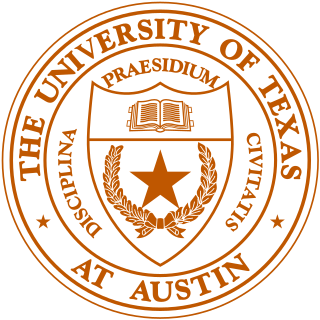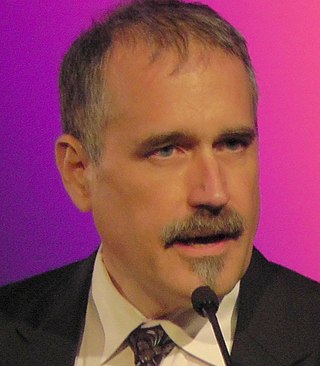Related Research Articles

Norman Hackerman was an American chemist, professor, and academic administrator who served as the 18th President of the University of Texas at Austin (1967–1970) and later as the 4th President of Rice University (1970–1985). He was an internationally known expert in metal corrosion.

The University of Texas at Austin is a public research university in Austin, Texas, United States. Founded in 1883, it is the flagship institution of the University of Texas System. With 52,384 students as of fall 2022, it is also the largest institution in the system.

Sandra Moore Faber is an American astrophysicist known for her research on the evolution of galaxies. She is the University Professor of Astronomy and Astrophysics at the University of California, Santa Cruz, and works at the Lick Observatory. She has made discoveries linking the brightness of galaxies to the speed of stars within them and was the co-discoverer of the Faber–Jackson relation. Faber was also instrumental in designing the Keck telescopes in Hawaii.

David Norman Schramm was an American astrophysicist and educator, and one of the world's foremost experts on the Big Bang theory. Schramm was a pioneer in establishing particle astrophysics as a vibrant research field. He was particularly well known for the study of Big Bang nucleosynthesis and its use as a probe of dark matter and of neutrinos. He also made important contributions to the study of cosmic rays, supernova explosions, heavy-element nucleosynthesis, and nuclear astrophysics generally.

The Lyndon B. Johnson School of Public Affairs is a graduate school at the University of Texas at Austin that was founded in 1970. The school offers training in public policy analysis and administration in government and public affairs-related areas of the private and nonprofit sectors. Degree programs include a Master of Public Affairs (MPAff), a mid-career MPAff sequence, 16 MPAff dual degree programs, a Master of Global Policy Studies (MGPS), eight MGPS dual degree programs, an Executive Master of Public Leadership, and a Ph.D. in public policy.
The Cockrell School of Engineering is one of the eighteen colleges within the University of Texas at Austin. It has more than 8,000 students enrolled in eleven undergraduate and thirteen graduate programs. Annual research expenditures are over $267 million and the school has the fourth-largest number of faculty in the National Academy of Engineering.
John Tinsley Oden was an American engineer. He was the Associate Vice President for Research, the Cockrell Family Regents' Chair in Engineering #2, the Peter O'Donnell, Jr. Centennial Chair in Computing Systems, a Professor of Aerospace Engineering and Engineering Mechanics, a Professor of Mathematics, and a Professor of Computer Science at The University of Texas at Austin. Oden has been listed as an ISI Highly Cited Author in Engineering by the ISI Web of Knowledge, Thomson Scientific Company.

Alan Conrad Bovik is an American engineer, vision scientist, and educator. He is a professor at the University of Texas at Austin (UT-Austin), where he holds the Cockrell Family Regents Endowed Chair in the Cockrell School of Engineering and is Director of the Laboratory for Image and Video Engineering (LIVE). He is a faculty member in the UT-Austin Department of Electrical and Computer Engineering, the Machine Learning Laboratory, the Institute for Neuroscience, and the Wireless Networking and Communications Group.
Andrea Alù is an Italian American scientist and engineer, currently Einstein Professor of Physics at The City University of New York Graduate Center. He is known for his contributions to the fields of optics, photonics, plasmonics, and acoustics, most notably in the context of metamaterials and metasurfaces. He has co-authored over 650 journal papers and 35 book chapters, and he holds 11 U.S. patents.

Claudia Megan Urry is an American astrophysicist, who has served as the President of the American Astronomical Society, as chair of the Department of Physics at Yale University, and as part of the Hubble Space Telescope faculty. She is currently the Israel Munson Professor of Physics and Astronomy at Yale University and Director of the Yale Center for Astronomy and Astrophysics. Urry is notable not only for her contributions to astronomy and astrophysics, including work on black holes and multiwavelength surveys, but also for her work addressing sexism and sex equality in astronomy, science, and academia more generally.
Sharon Mosher is an American geologist. She did her undergraduate work at University of Illinois Urbana-Champaign. After earning an MSc from Brown University, she returned to the University of Illinois to get her PhD in Geology in 1978. Since 2001 she has held the William Stamps Farish Chair at University of Texas, and, since 2009 she has served as the dean of the Jackson School of Geosciences at Texas. In 2013 she became the president of the American Geosciences Institute.
Theodore (Ted) Scott Rappaport is an American electrical engineer and the David Lee/Ernst Weber Professor of Electrical and Computer Engineering at New York University Tandon School of Engineering and founding director of NYU WIRELESS.
Kara M. Kockelman, Ph.D., P.E. is an American civil and transportation engineer, who is currently the Dewitt Greer Centennial Professor of Transportation Engineering at the University of Texas at Austin, previously the Clare Boothe Luce Professor of Civil Engineering, and a published author. Kockelman’s work focuses on transportation, and includes planning for future implementation of shared and autonomous vehicle systems, and policies like credit-based congestion pricing and urban growth boundaries.
Molly S. Bray is an American geneticist, currently the Susan T. Jastrow Human Ecology Chair for Excellence in Nutritional Sciences at University of Texas at Austin. Bray is a nationally recognized expert and a featured speaker on the genetics of obesity, energy balance, and exercise response. She is a Professor and chair in the Department of Nutritional Sciences at the University of Texas at Austin, with a master's degree in Exercise Physiology from the University of Houston and a PhD in Human and Molecular Genetics from the UT Graduate School of Biomedical Sciences. She also served as the former Director of the Heflin Center for Genomic Science Genomics Core Laboratory at the University of Alabama at Birmingham and the Children's Nutrition Research Center/Baylor College of Medicine Genetics Core Laboratory. Bray's research focuses on the relationship between energy balance and lifestyle factors such as exercise, nutrition, and circadian patterns of behavior. Her findings related to how the timing and quality of energy intake affect weight gain and metabolic health have been featured on national and international news programs and a myriad of websites and popular news media. Bray also currently leads one of the largest genetic studies of exercise adherence established to date, the Training Interventions and Genetics of Exercise Response (TIGER) study, with a total cohort of more than 3,700 individuals. Bray's research has included investigations of aerobic fitness and resting and exercise energy expenditure in children and adolescents, circadian studies of feeding and metabolic response, and clinical studies of morbidly obese adolescents undergoing bariatric surgery. Bray has published extensively in a wide range of peer-reviewed journals and her work has been featured in national and international scientific meetings.
Kristen Lorraine Grauman is a professor of computer science at the University of Texas at Austin on leave as a research scientist at Facebook AI Research (FAIR). She works on computer vision and machine learning.

Deji Akinwande is a Nigerian-American professor of Electrical and Computer Engineering with courtesy affiliation with Materials Science at the University of Texas at Austin. He was awarded the Presidential Early Career Award for Scientists and Engineers in 2016 from Barack Obama. He is a Fellow of the American Physical Society, the African Academy of Sciences, the Materials Research Society (MRS), and the IEEE.
Joseph Curtis "Joe" Salmons is an American linguist who is Professor of Language Sciences at University of Wisconsin–Madison.
Christine E. Schmidt is an American biomedical engineer. As a professor at the University of Florida, Schmidt was inducted into the Florida Inventors Hall of Fame for her creation of the Avance Nerve Graft which has "improved the lives of numerous patients suffering from peripheral nerve damage." In 2024, Schmidt was elected to both the National Academy of Engineering and the National Academy of Medicine.
C. Grant Willson is a professor at the University of Texas at Austin.
References
- ↑ . University of Texas at Austin Kormendy's website http://chandra.as.utexas.edu/jk_public_vita.html1title=John Kormendy's website . Retrieved 2020-07-10.
{{cite web}}: Check|url=value (help); Missing or empty|title=(help)[ permanent dead link ] - ↑ "Faculty". utexas.edu. Retrieved December 11, 2016.
- ↑ "John Kormendy". utexas.edu. Retrieved December 11, 2016.
- ↑ "Kormendy, John". worldcat.org. Retrieved December 11, 2016.
- ↑ The Kormendy Relation, utexas.edu
- ↑ Schneider, Peter (2007). Extragalactic astronomy and cosmology: an introduction. Springer. p. 92. ISBN 9783540331759.
- ↑ "John Kormendy's website". University of Texas at Austin . Retrieved 2020-05-18.
- ↑ "2020 NAS Election". National Academy of Sciences. April 27, 2020. Retrieved 2020-05-18.
- ↑ "Three UT Austin Faculty Elected to National Academy of Sciences". April 27, 2020. Archived from the original on 2021-02-09. Retrieved 2020-05-18.